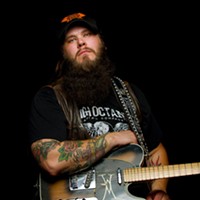Pretty In Punk
By taking a more sophisticated musical approach, have some bands lost their edge?
By Chris ParkerThis is a fact bemoaned ad nauseam by purists, but that doesn't make it any less disturbing. The anger and alienation punk was meant to capture did momentarily escape, only somewhat diminished, onto the airwaves in the form of its less-loved stepchild, grunge. The Seattle sound tried to convey the anomie of middle-class American existence. Ironically, the success of grunge destroyed the then-vibrant metal scene (which itself had become a pale, saccharine imitation of its initial antiauthoritarian impulse), but eventually grunge's attitude was reclaimed by the free-floating angst of quasi-metal bands like Linkin Park and Trapt, who resurrect the old alt-rock idea of confrontation.
All these angry youths, generation after generation of them. Fists raised, voices aloft. Raging against the machine in variously mutated forms that do little but echo the screams that came before them. Times change, people change, echoes decay and, eventually, we must wonder: What next?
"Those strange echoes," says Iron and Wine's Sam Beam. "When it comes back it doesn't really have the same voice, does it?"
Beam grew up on punk rock, but when he began making music it was a decidedly un-punk sound he chose to explore. Hints of country and the sonorous sounds of 70s pop suffuse the South Florida resident's soft, delicate music. That his music appeals to the same audiences -- and the same record label, Sub Pop -- that embraced Soundgarden and Nirvana is somewhat shocking. More interesting still is the fact that Beam is far from the only one treading these unexpected paths. The underground is rife these days with acts purveying a rich baroque sound replete with strings and horns, or attempting gentle, elegiac, heavily melodic music that would have seemed anathema to bands a quarter century ago.
"The idea of what is punk has completely been lost on most people who would claim to be punk nowadays," says Nick Stampf of the French Kicks, whose initial garage-rock sound drew comparisons to the Strokes, but who have moved on to a pretty, fully fleshed sound that has more in common with Rufus Wainwright or New Order than with the MC5. "I've always thought of our band as having a serious punk element in the sense that we don't give a shit what else is going on, and we just do our own thing. That's the punk idea. It takes a lot more balls to make this kind of music than it does to shit out garage-rock songs."
What happened to inspire all these kids to toss their three-chords-and-an-attitude for dobros and string sections? The easiest suggestion is to point to radio and the underground's knee-jerk contrarian impulse.
"It's like hard music is definitely the mainstream, so whatever the mainstream is, the underground is going to take a left turn," suggests guitarist Jay Ferguson of the Beatlesque Canadian band Sloan.
"Someone making [the Beach Boys'] Pet Sounds today wouldn't even be considered Top 40," Ferguson continues. "I mean something like "Good Vibrations" -- I can't imagine that being a hit today; to me that's a record that the Flaming Lips would make today. It's definitely more underground and for a specific audience as opposed to a No. 1 hit."
But such ideas are oversimplifications. While it would be naive for musicians to suggest that they're unaware of what's going on in mainstream radio -- after all, it pervades every corner of the pop culture -- it's equally true that few artists could be bothered to be such obvious reactionaries.
"I have a personal problem with creating things from a negative stance. I'd rather not react against things," says Eric Bachmann, former frontman of indie rockers Archers of Loaf, who now makes music as a solo artist under the name Crooked Fingers. "There's no way I could be honest and react to the radio, because I don't even listen to it. I hear the radio, and that sounds like the radio. And I don't want to hear that because it's shit. So I don't react to it."
Beggars Group CEO Lesley Bleakley agrees. As an umbrella home to labels such as Matador, 4AD and Too Pure, as well as the stalwart Beggars Banquet imprint, the Beggars Group has released albums by bands such as Belle & Sebastian, the Delgados, Mercury Rev, Badly Drawn Boy, Tindersticks, Cocteau Twins, Yo La Tengo and Luna -- all of whom have fashioned albums of beautiful, supple music.
"We work with an awful lot of bands that are like that, and I kind of feel strange to think that it might be a reaction to what's on the radio, because I don't really care what's on the radio," Bleakley says. "I don't think it's a conscious decision on anyone's part, as a reaction against what's going on in "Modern Rock.' Psychologically, there might be a sort of reaction to that by sort of becoming the pretty, delicate, lovely indie sounds that we've had, but I can't imagine it's conscious. Is it because these people are getting a little bit older and less aggressive?"
Speaking of Vibes_feature.html
-

The New Mythology of AFRO-FUTURISM
Jul 20, 2005 -

Nothing Fails Like Success
Jul 13, 2005 -

Scarlet Begonias
Jul 6, 2005 - More »
Latest in Music Features
More by Chris Parker
-

CD Review: Antibalas
Sep 28, 2012 -

CD Review: Baroness' Yellow and Green
Sep 25, 2012 -

Southern comfort: Whitey Morgan
Jul 19, 2012 - More »
Calendar
-

Haw River Wine Tasting @ Carolina Beer Temple.
-
ATTILA, BORN OF OSIRIS w/ TRAITORS, EXTORTIONIST, NOT ENOUGH SPACE @ The Underground
-
 Toto: Dogz Of Oz Tour @ Ovens Auditorium
Toto: Dogz Of Oz Tour @ Ovens Auditorium -
NEEDTOBREATHE: THE CAVES WORLD TOUR @ PNC Music Pavilion
-
NEEDTOBREATHE - VIP Upgrades @ PNC Music Pavilion













